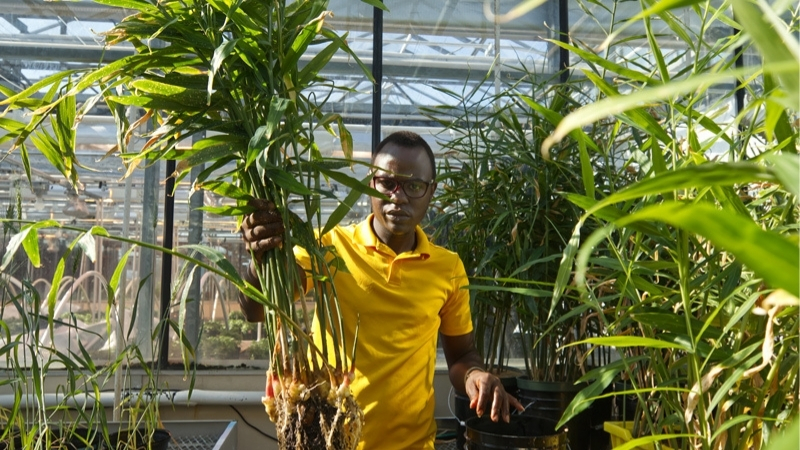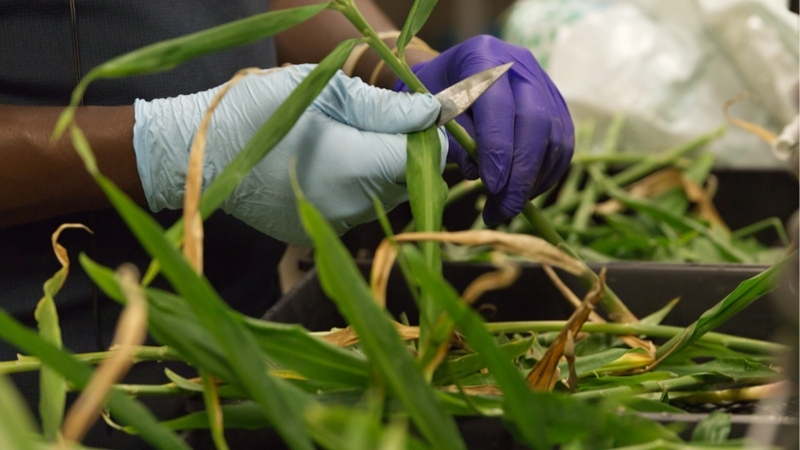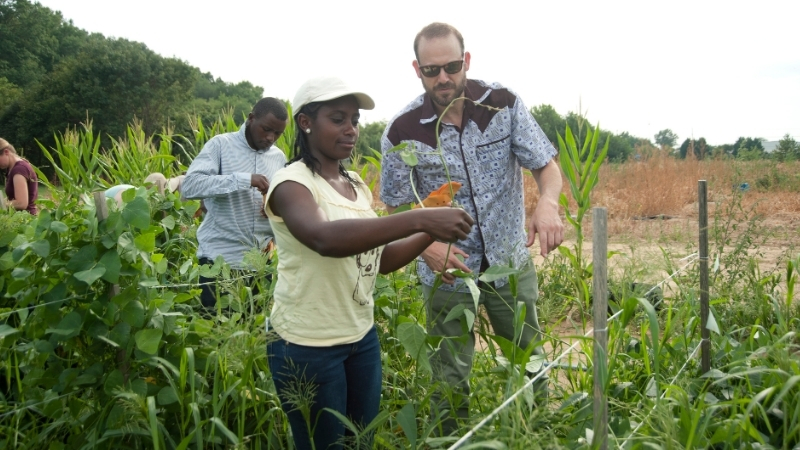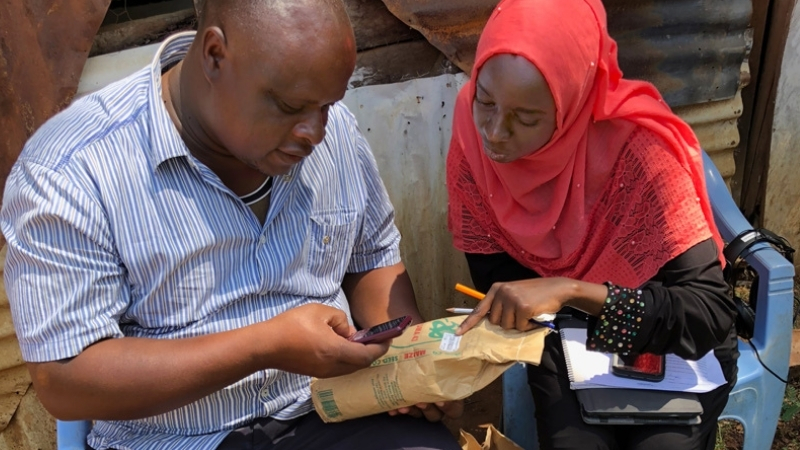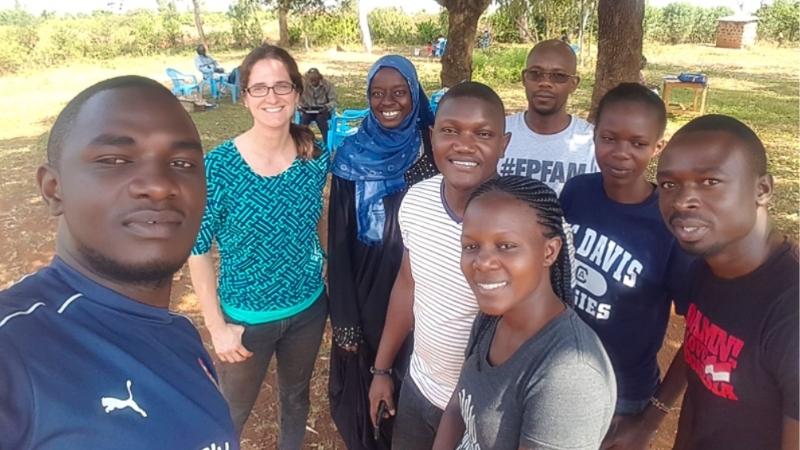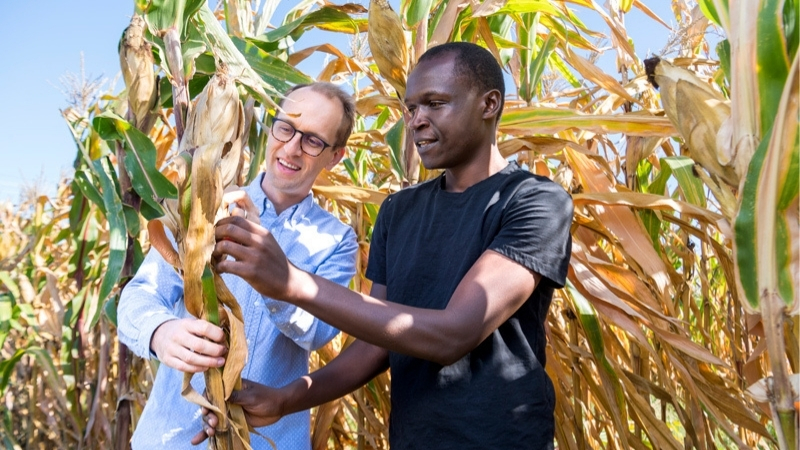
Borel Global Fellows Program
Educating future knowledge leaders
Thanks to a generous gift from Jim and Marcia Borel, the Borel Global Fellows Program supports students from Sub-Saharan Africa to pursue a master’s of science degree at the University of Delaware College of Agriculture and Natural Resources (CANR).
The program increases food security, improves agricultural development, and conserves natural resources in Africa by educating scientists at UD. These knowledge leaders will then return to their native countries to promote and improve wealth and health for farmers.
About the Program
The Borel Global Fellows Program (BGFP) is unique in that it blends the educational experience at the University of Delaware with an applied research experience in the student’s home country.
Students spend 12 to 18 months at the University of Delaware, completing coursework, developing research skills, and laying the foundation for their research project in partnership with their UD faculty sponsor and their in-country faculty mentor. The next six to 12 months are spent in the student’s home country, completing the majority of their research project and preparing their thesis defense.
One to two Borel Global Fellows are supported each year.
Areas of focus
Borel Fellows’ research areas are broad in scope and can include topics in plant and soil sciences, agriculture and resource economics, wildlife ecology and entomology, and animal and food sciences.
Become a Borel Fellow
Citizen of a Sub-Saharan African country
- B.S. degree (or equivalent) in an area of plant and soil sciences, agriculture and resource economics, wildlife ecology and entomology, or animal and food sciences
- Holding of an advanced degree does not preclude consideration of the Borel Fellows Program
Three to five years of post-graduation work experience in the agricultural or natural resource sectors
A sincere and demonstrated passion to pursue a master’s degree and return to the home country to contribute to agricultural development, increased food security, natural resource conservation and/or agribusiness development
Acceptance to the Borel Global Fellows Program, which ensures placement with a UD/CANR faculty member
Admission to a graduate program in the University of Delaware’s College of Agriculture and Natural Resources
Documented support of an African research institute and an African faculty mentor, as described below
Acceptable scores on the GRE exam, if required by the program of study
Acceptable scores on the TOEFL exam for students coming from non-English speaking countries
Ability to obtain a student visa (F-1) and travel to the U.S. from the home country
Access to reliable internet in the home country
- Sept. 1: Application process opens
- Nov. 15: Application process closes
- Oct. 1 to Dec 1: Rolling internal review of BGFP applicants
- Dec. 15: Finalists are notified and initiate UD application process
Students interested in being considered for the BGFP should apply to the Borel Program before applying to the University of Delaware. The BGFP application outcome may influence one’s interest in pursuing graduate studies at UD. Please follow the steps below to apply to the Borel Global Fellows Program.
Applicants should submit the following to be evaluated for the Borel Global Fellows Program:
Resume or curriculum vitae
Undergraduate transcript(s)
Personal statement describing post-undergraduate agricultural work experience and how the fellowship will aid in advancing their career goals
Names and contact information for three references who can judge the applicant’s scholastic capability and potential for research at the graduate level; references will be contacted for further information once the application is reviewed by UD.
Two letters of commitment are required:
One from an African research institute or university pledging to support the Fellow for the African portion of their fellowship. This support will allow the Fellow to complete the thesis project following return to Africa and may include access to research facilities, office space, internet and libraries. In-kind financial support of the Fellow (typically tuition, fees and research costs) during the African portion of the project must be addressed either in this letter or the letter from the African research director or faculty member.
One from an African research director or faculty member who agrees to partner with the UD faculty member on advising the Fellow’s research project, both while the student is at UD and following return to Africa. In-kind financial support of the Fellow (typically tuition, fees and research costs) during the African portion of the project must be addressed either in this letter or the letter from the African research institute.
All materials should be submitted together in one email to BorelFellows@udel.edu by the deadline above.
Each Borel Global Fellow receives generous financial support, including:
A full waiver of tuition at the University of Delaware;
Coverage of all UD student fees;
Graduate research assistant funding while in Delaware, which includes a stipend, access to health care, and entry into campus facilities such as wellness and recreation facilities;
One-time roundtrip airfare (economy class) to/from the US;
Computer allowance of up to $1,000 (purchased in Delaware);
Waiver of the UD application, GRE exam, and TOEFL exam fees;
Reimbursement of SEVIS and visa fees (Applicants are required to pay these costs upfront);
Financial support of up to $5,000 for the “in residence” portion of the fellowship in Africa; and
A $1,000 honorarium for the student’s Africa-based advisor to oversee the in-country research portion of the fellowship.
Contact
For more information on the Borel Global Fellows Program, please send inquiries to BorelFellows@udel.edu.
For more information on UD services and resources for international students, please visit International Student and Scholar Services.
Our hope is to find future leaders who can learn as much as they can and then make a difference back home.
Explore CANR Graduate Programs
Borel Fellows Profiles
Past Fellows

Shem Elias
Home country: Tanzania
Completed Degrees: Bachelor of Science, Horticulture, 2015 (Sokoine University of Agriculture); Master of Science, Plant and Soil Science, 2023 (University of Delaware)
Current program: Pursuing a Doctor of Philosophy (Ph.D.) in Controlled Environment Horticulture and Urban Agriculture (University of Delaware).
Area of Research: Plant and Soil Science
Since earning my first degree at UD, I have remained in academia and am currently pursuing a Ph.D. in Plant and Soil Science. Along the way, I have developed a deep passion for research, discovery, and the pursuit of new knowledge. I find immense fulfillment in exploring complex scientific questions, analyzing data, and contributing to my field through writing and research. This journey has reinforced my love for learning and the endless possibilities that come with it.
To future Borel Fellows, I’d say: make the most of every opportunity that comes your way. Dive into your research with curiosity, seek out mentors, and build meaningful collaborations; they’ll shape both your work and your growth as a scientist. Be open to challenges, explore different perspectives, and don’t be afraid to step outside your comfort zone.
Communication is just as important as research, so work on sharing your ideas clearly, whether in writing or presentations. Most importantly, enjoy the process. This journey isn’t just about research; it’s about growing, learning, and making an impact in your field.

Isaac Kamweru
Home country: Kenya
Degree(s): Bachelor of Science, Biochemistry, 2010 (Moi University); Master of Science, Plant and Soil Sciences, 2018 (Unviersity of Delaware); Doctor of Philosophy (Ph.D.) Plant Breeding, 2023 (Pan African University Institute of Life and Earth Sciences / University of Ibadan).
Area of Research while at UD: Plant and Soil Science
After earning a Bachelor's degree in Biochemistry from Moi University, Kenya, I pursued advanced studies in agricultural sciences, focusing on plant breeding and genetics. I furthered my education by obtaining a Master's in Plant and Soil Sciences from the University of Delaware, where I gained expertise in crop improvement through molecular breeding techniques.
My academic journey continued with a Doctorate in Plant Breeding, earned through a collaborative program between the Pan African University, Institute of Life and Earth Sciences and the University of Ibadan. During my doctoral research, I had the privilege of being hosted by the International Maize and Wheat Improvement Centre (CIMMYT). My work centered on genomics-assisted breeding strategies aimed at enhancing host plant resistance to the Fall Armyworm insect pest that attack maize crop — the most relevant staple in East Africa.
Beyond research, I'm actively involved in mentoring young scientists and serving as a peer reviewer in my field. Currently, I'm a Post-doctoral Fellow at the International Crops Research Institute for the Semi-Arid Tropics (ICRISAT), Pigeonpea breeding program in Kenya.
This fellowship award is a career-defining opportunity that will enable participants to connect and learn from globally re-known faculty and industry professionals. As a Borel Fellow, you acquire an invaluable higher educational experience, critical in scaling the heights of your career and make significant contributions to scientific progress for development.

Pius Kilasy
Home country: Tanzania
Degree(s): Master of Science in Agricultural Economics and Agribusiness, 2021 (University of Delaware).
Area of Research while at UD: Micronutrient deficiency among women of reproductive age in Tanzania.
Through the Borel Fellows sponsorship, I conducted research that could provide intervention measures to combat micronutrient deficiency. Without their support, I could not fulfill the ambition of advancing my career. The Borel Global Fellows program helped expand my research experience and knowledge. My advice to prospective Borel Fellows is to work hard to utilize project funding in a profitable manner.
[One of my achievements was organizing, establishing and registering] an NGO, Green Kilimo Tanzania, focused on conservation and restoration of terrestrial ecosystems and clean water and sanitation among others. This would couldn't have been possible without the Borel program...I regard this milestone an immense contribution of the Borel Global Fellowship.
Former Borel Global Fellow

